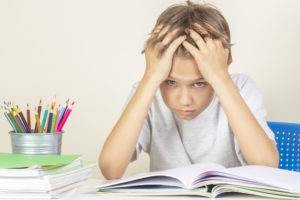Do you think something is holding your child back in school? Learn to identify the early signs and symptoms of dyslexia and get your child the help they need.
You’ve heard the idea that someone who has dyslexia reverses their letters. They write the letter b when it should be d.
Dyslexia is a general term that combines the struggles of learning a language and reading. It isn’t easy to understand how connected letters create sounds and words. Many early signs of dyslexia go beyond struggling with letters, and there are also many different levels of dyslexia, ranging from mild dyslexia to more severe cases.
Most diagnoses for dyslexia happen when a child is school-aged. That’s when they are learning to read, recognize sounds and letters, and associate the letters with words. Often children exhibit multiple warning signs.
Statistics show that 30 to 60 percent of children with parents who have a dyslexia diagnosis will have a reading disorder.
Learn about these early signs of dyslexia that might show up at your child’s different developmental stages and if you may need to look into visiting a dyslexia testing center.
Dyslexia Warning Signs in Pre Schoolers
While children at this young age are most likely not reading yet, there are still some early warning signs to watch for, such as:
- Delayed speech development
- Muddling words and sounds
- Difficulty learning nursery rhymes
- Difficulty learning new words
- Struggling to learn the alphabet
- Difficulty rhyming or understanding rhymes
- Trouble gripping a writing instrument
The warning signs for this age can show up in verbal language, behavior, hearing, speech, and motor skills.
School Age Warning Signs
Dyslexia diagnoses are most commonly identified in school-aged children. In the early grades of elementary school, one of the main focuses is reading. Dyslexia is directly connected to reading disabilities.
Some of the warning signs associated with a dyslexia learning disability in school-age children include:
- Issues recognizing sight words
- Spelling words incorrectly
- Spelling the same word differently on the same paper
- Letter reversals or incorrectly formed letters
- Not recognizing letter blends
- Difficulty learning to tell time
- Missing or skipping words when reading
- Difficulty extracting meaning from reading
Often children who have warning signs of dyslexia display multiple signs. They are struggling in school and with language. It is challenging to get the correct diagnosis because it so closely overlaps with the warning signs associated with other learning disabilities.
Warning Signs In Middle Schoolers
Because the warning signs often overlap with other disabilities, sometimes they are missed. They become more prevalent as children go up in grades because they use even more language, the reading becomes more challenging, and more in-depth writing is expected.
Here are some common symptoms of dyslexia for kids in secondary classes:
- Speaking ability that far exceeds writing ability
- Reads and rereads sentences to get meaning
- Misses or skips words or word endings when reading
- Difficulty writing at an appropriate grade level speed
- Reluctance to read aloud
- Confusing left and right
Older kids with dyslexia will often use avoidance to get out of reading or writing. They know it is difficult or they can’t understand the language and will do things to cover up their disability.
Early Signs Of Dyslexia
Dyslexia is so tricky to diagnose because it overlaps with other disabilities. Kids might recognize that reading or language is challenging but not be able to explain how it’s different for them.
The key to a diagnosis is watching for the early signs of dyslexia. Watch for the signs and patterns while a child tries to master language and reading.
To get help understanding dyslexia or for dyslexia testing, contact us today. We specialize in dyslexia tutoring and advocacy for your child at school.

